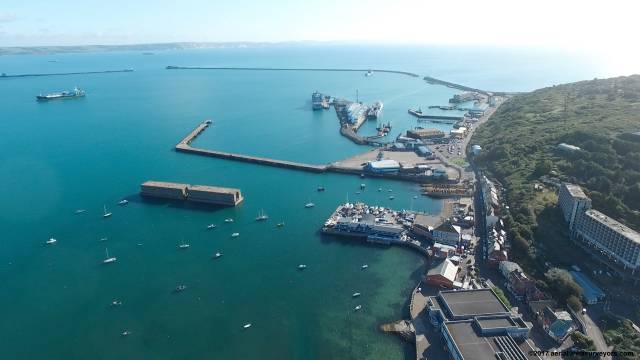In the UK at a port in Dorset is based a ship repair and engineering services company Intermarine UK which has struck a new agreement with a Chinese manufacturer to make the Port of Portland one of the nation's centres for ‘scrubber’ installation. (See below explanatory notes on scrubber technology)
Intermarine President Slawomir Kalicki signed the agreement at the Nor Shipping trade fair in Oslo with counterpart DB Wang deputy general manager of the Shandong Pure Ocean Technology based in Renhe Town in the Shandong province.
The deal will see Intermarine act as an agent to Shandong and offer to install its scrubber systems to a wide variety of vessels to help them meet tough new environmental regulations. This includes bulk, container and cruise ships as well as Ro-Pax and Ro-Ro ferries, tankers, car carriers and fishing vessels.
Scrubbers or Exhaust Gas Cleaning Systems (EGCS – see background) are one of the hottest topics in the global maritime industry as a result of tough new sulphur emission regulations coming into effect under the Marpol Treaty.
Mr Kalicki said Intermarine’s base at Portland Port is ideally located to service ships requiring scrubbers operating on the busy English Channel and Trans-Atlantic shipping routes.
“We see a big demand for scrubbers now the deadline is fast approaching,” he said. “Working with Shandong we can offer ship owners and operators a first-class scrubber system and we can help ensure the system is approved by the ship’s Flag Administration and the approval is properly evidenced in the ship’s IAPP Certificate (International Air Pollution Prevention Certificate). Shandong's scrubbers are state of art products and critically they have a very fast installation time saving up to 25 days on the average scrubber installation. Another big advantage is Portland Port's ability to offer sheltered harbour for a wide variety of large ships, with multiple deep-water berths and low tidal ranges.”
Mr Kalicki said while some of the global merchant fleet of 95,000 ships are expected to opt for compliant fuel, particularly the cheaper blends, to meet the legislation this option carries high risks.
“The risk of off-specification fuel, the potential for engine failure and port state penalties, not to mention supply and price constraint make scrubbers an attractive alternative,” he said. “Scrubber installation offers the safest, most cost-effective way to meet the new targets in the medium and long term. Scrubber pay-back is estimated at one to three years depending on ship size, according to classification society DNV GL’s 2018 report Global Sulphur Cap 2020. Working with Shangdong we aim to position Intermarine’s Portland Port operation as one of the UK’s prime locations for scrubber installation.”
Since opening its Portland Port workshop, Intermarine UK has been able to provide an extensive range of engineering and fabrication services to the UK’s ship repair, refit, conversion and shipbuilding markets. The firm is also diversifying into other industries, including the energy sector and renewables, to optimise its specialist skills and production capabilities.
Backgound on 'Scrubber' Technology
From 1 January 2020, the Marpol Treaty stipulates that the limit for sulphur in fuel oil used on board ships operating outside designated emission control areas will be reduced to 0.50% m/m (mass by mass) a steep drop from the previous 3.5% m/m limit.
This will significantly reduce the amount of sulphur oxides emanating from ships and is designed to have major health and environmental benefits for the world, particularly for populations living close to ports and coasts.
Scrubbers are used to remove particulate matter and harmful components, such as sulphur oxides (SOx) and nitrogen oxides (NOx) from the exhaust gasses generated as a result of combustion processes in marine engines, to implement pollution control.
The scrubbing systems have been developed and employed to treat exhaust from engines, auxiliary engines and boilers, onshore and onboard marine vessels, to ensure that no damage is done to human life and the environment by toxic chemicals.
































































